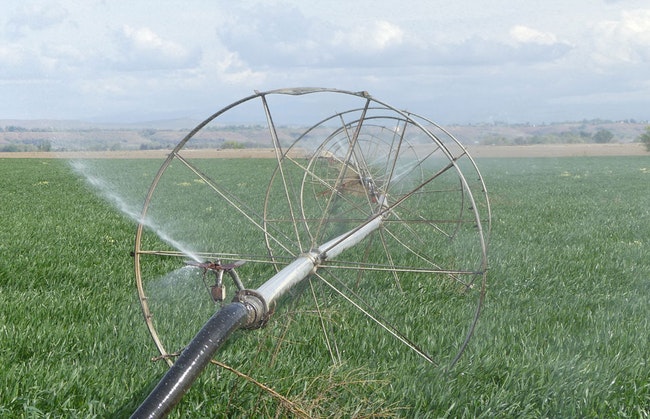
A new bill introduced by a member of Idaho’s congressional delegation could provide undocumented agricultural workers with a path to legal status — and open up new workforce options for desperate Idaho dairy farmers.
Rep. Mike Simpson, R-Idaho, and five other House members introduced the Farm Workforce Modernization Act, H.R. 4916, on Wednesday. The bill — cosponsored by 20 Republicans and 24 Democrats — also proposes mandatory use of the federal government’s E-Verify system by all agricultural employers to confirm workers’ legal eligibility. Rep. Greg Walden, R-Oregon, is a co-sponsor.
It also makes a series of changes to the H-2A Temporary Agricultural Workers program to streamline the application process and make year-round agricultural operations like dairies eligible to hire workers through the program.
“My constituents have been asking me to fix our immigration laws since my first day in Congress,” said Simpson, who was first elected in 1998, in the Wednesday press release. “There is perhaps no more important facet of immigration reform for Idaho and its economy than the agriculture workforce.”
The bill could provide legal status and — and a possible, eventual path to citizenship — for many of the roughly one million farmworkers estimated to be living in the U.S. illegally.
There are about 35,000 undocumented immigrants living in Idaho, according to a Pew Research Center analysis of 2016 data, and the Idaho Dairymen’s Association estimates that 90 percent of Idaho dairy employees were born outside the U.S. The analysis showed about 110,000 undocumented immigrants in Oregon.
Past attempts at meaningful immigration reform have met congressional deadlock and discord for decades, with Republicans and Democrats unable to compromise over issues as wide-ranging as border security and the Dream Act.
About 40 Idaho organizations have already announced their support of the bill, including the Idaho Dairymen’s Association, the Community Council of Idaho, Simplot, Chobani, the Idaho Association of Highway Districts, the Idaho Hop Growers Association and the Idaho Potato Commission.
The Idaho Dairymen’s Association said the bill addresses dairy producers’ desperate need for workforce stability, while also providing for the workers already in the United States.
“These are individuals who have come to America to try to better themselves and their families,” Naerebout said. “They’ve been a key piece of the success of the dairy industry, and it’s only right that they be afforded the same opportunities that our dairymen and their families were afforded in the past.”
The bill also received support from the United Farm Workers of America union, which called it a “thoughtful compromise” that would provide stability for some farmworkers and their families.
Irma Morin, the CEO of the Community Council of Idaho, a nonprofit that provides services to farmworkers and their families, said the organization is grateful for Simpson’s and the Idaho Dairymen’s Association’s work on the issue.
“This bill will help farmworkers obtain legal status and keep them from living in fear and in the shadows,” Morin told the Statesman in a text Thursday.
Under current immigration laws, it can be difficult for undocumented immigrants living in the U.S. to obtain legal status after entering without inspection or illegally overstaying a visa.
“Getting our farmers’ employees right with the law will provide economic stability to our rural communities and make our country safer by creating a legal, merit-based agriculture immigration system that allows our valuable law enforcement resources to focus on the bad actors,” Simpson said.
Under the bill, agricultural workers who can show at least 180 days of agricultural employment over the last two years can apply for five-year renewable visas if they qualify. Ineligible workers who still have agricultural experience would be allowed to apply for H-2A visas.
According to a fact sheet, eligible workers would also have the opportunity to apply for and earn legal permanent resident status after paying a $1,000 fine and meeting one of several criteria:
The bill’s proposed changes to the H-2A system allow employers to file one request for all workers needed throughout the year, and eliminate current requirements to run job postings in local newspapers. The requirement is intended to encourage farmers to hire American workers.
Forty thousand more green cards providing permanent residency would be allocated each year to agricultural workers, and the U.S. Department of Agriculture would triple the amount of funding available for building new housing for farm labor.
Crucially, agricultural employers in need of labor year-round like dairies would also have access to the program for the first time through new temporary three-year visas.
Naerebout, of the Idaho Dairymen’s Association, said access to workers through temporary visas like the H-2A program is as much a priority as keeping the workers Idaho dairies already employ.
“For our dairymen specifically, they have been really working through a labor crisis the last few years,” Naerebout said, citing low unemployment and national immigration crackdowns. “This will provide us an opportunity to really see all those positions filled and have a much more stable workforce than we’ve been able to.”
Joel Anderson, the executive director of the Snake River Farmers Association in Heyburn, helps agricultural employers comply with federal requirements to hire temporary workers through the H-2A program.
“I do hope on behalf of the dairy industry and those who haven’t had access to a program that works for them. … I do hope that we can get some resolution in the system that works for them,” Anderson said by phone.
Anderson said his association still hopes lawmakers will address another concern over the federally mandated wages farmers are required to pay H-2A workers, known as the AWER, short for adverse effect wage rate.
Idaho Farm Bureau spokesman Sean Ellis told the Statesman Thursday that the availability of labor is one of the biggest challenges facing Idaho’s agriculture, and any legislation that addressed the issue is “welcome.”
“We do have some concerns with the legislation and are working to address them and make the bill even better for producers,” Ellis wrote in a follow-up email.
Naerebout said this bill “is the first time since 2013 that we’ve had a bipartisan bill that we feel adequately addresses the needs of both the ag community and also the immigrant community.”
H.R. 4916 was referred to the subcommittees House Judiciary, House Ways and Means, House Education and Labor, and House Financial Services Wednesday and could reach the House floor by late November, according to the Wall Street Journal.
“We’re hopeful that we can see this piece of legislation move it’s way through the process,” Naerebout said. “We’re remaining cautiously optimistic that we can get there.”
Republished with permission.




